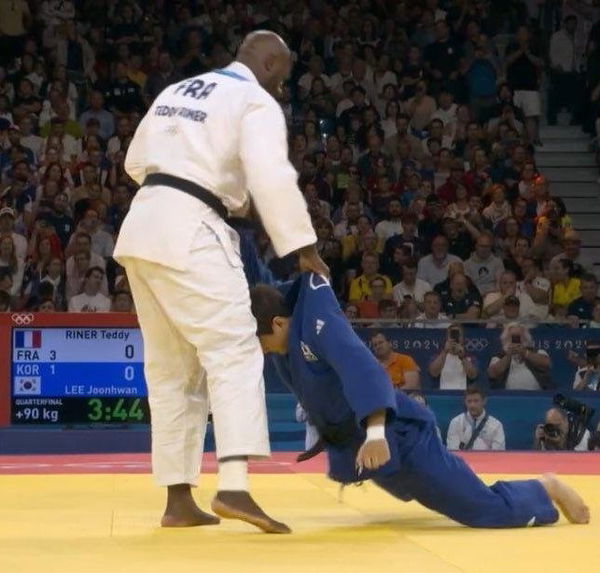

Arguably one of the greatest judo contestants of all time, Teddy Riner claimed his rightful gold medal in the +100kg category by defeating Kim Min-jong at the Paris Olympics. He finally avenged his defeat after claiming a bronze medal at the 2020 Tokyo Olympics. Meanwhile, France won the gold in the mixed-team event but had its fair share of controversies. In the quarterfinals against South Korea, Riner faced criticism for easily decimating an opponent in 94 seconds. Well, sounds strange!
A viral picture made rounds on the internet where Riner stood beside his opponent to battle off. But in the picture, it sure looked like a David vs Goliath battle- literally! South Korea fielded Joonhwan Lee to face off against the 6’8″, 308lbs (140 kg) mega mountain from France! Joonhwan Lee stood at 5’9 and a half”, 178lbs (81 kg)! With accusations floating around, a fan on Reddit detailed the entire confusion regarding the event. As many wonder if the French champion ‘cheated’ his way out, there is much more to it! The Reddit user summed up the entire situation perfectly.
ADVERTISEMENT
Article continues below this ad
No, Teddy Riner didn’t cheat his way to gold medals at the Paris Olympics!
The picture showcased Joonhwan Lee, who had won a bronze at -81kg head-to-head against +90kg weight class judo icon, Teddy Riner. Initially, one would be surprised to see the height and weight difference. However, judo is not as complex as many people believe. It’s rather straightforward. After they complete all the individual team events, the mixed event shows up as the 15th event in the competition. (apart from the other 14 events individual events).
For starters, here are the weight classes in Judo:
Men’s:
-60kg -66kg -73kg -81kg -90kg -100kg +100kg
Women’s:
-48kg -52kg -57kg -63kg -70kg -78kg +78kg
In the mixed team event, the team rounds up to 3 women (-57kg, -70kg, +70kg) and 3 men (-73kg, -90kg, +90kg). They automatically compete against other countries battling for supremacy. The nation to win the first 4 matches wins the team event. Consequently, it becomes a close-knit battle from the start. However, the issue arose during this section.
You see, South Korea failed to have a -73kg or a -70kg judoka. Notably, South Korea’s best -73kg judoka did not qualify for the Paris Olympics because of low world rankings. Likewise, the nation failed to qualify for the -70kg for the same reason, leading to complications in team selections. In the end, -66kg judoka An Baul fought for the -73kg category in the team event while -63kg Kim Jisu fought for the -70kg judo matches. The rule also states a person not qualified for the individual event cannot participate in the team event. All in all, South Korea found themselves in a muddle.
They had no choice but to send the underweight judokas to the weight classes above them. Both Baul and Jisu are undersized and it proved costly for the team. But there is another catch to it.
ADVERTISEMENT
Article continues below this ad
Significantly, the countries could send the judoka they want to compete. At times, with other medal hopes pinned on an athlete, the coaches decide to give them a rest and focus on the match, where the medal hopes are serious. In the case of Rinner, South Korea’s Joonhwan Lee didn’t stand a chance against Riner. To some extent, even Kim Min Jong didn’t have a chance.

via Reuters
Paris 2024 Olympics – Judo – Men +100 kg Quarterfinal – Champ de Mars Arena, Paris, France – August 02, 2024. Teddy Riner of France in action against Guram Tushishvili of Georgia. REUTERS/Kim Kyung-Hoon
To put things into perspective, South Korea met France in the mixed-team event and they were not the favorites. The coach decided to rest their biggest medal hopes, Kim Min Jong, in the +100kg category. It is worth mentioning that, based on the bracket structure, even those who lose in the quarterfinals and semi-finals can compete in the repechage rounds for the bronze medal. As a result, they chose not to put Kim in the match, despite him being South Korea’s strongest candidate for a gold medal in judo. Accordingly, South Korea’s head coach Hwang Hee Tae rested Kim, instead, bringing Joonhwan Lee to the forefront of the team event. You can guess the outcome of the result!
ADVERTISEMENT
Article continues below this ad
It seemed unlikely for Kim to win both the individual and team events with Riner in the way. So, the South Korean team pinned their hopes on a bronze medal victory in the team event by using him for that competition. In the end, it’s a win-win situation for all!
France won the mixed-team event while South Korea won the bronze medal, defeating Germany in a thrilling 4-3 contest at the Paris Olympics. The South Koreans replenished their batteries with a rest and went all the way. To sum up, it was all perfectly legal and Rinner did not cheat his way to a win!
ADVERTISEMENT
ADVERTISEMENT
ADVERTISEMENT
ADVERTISEMENT

